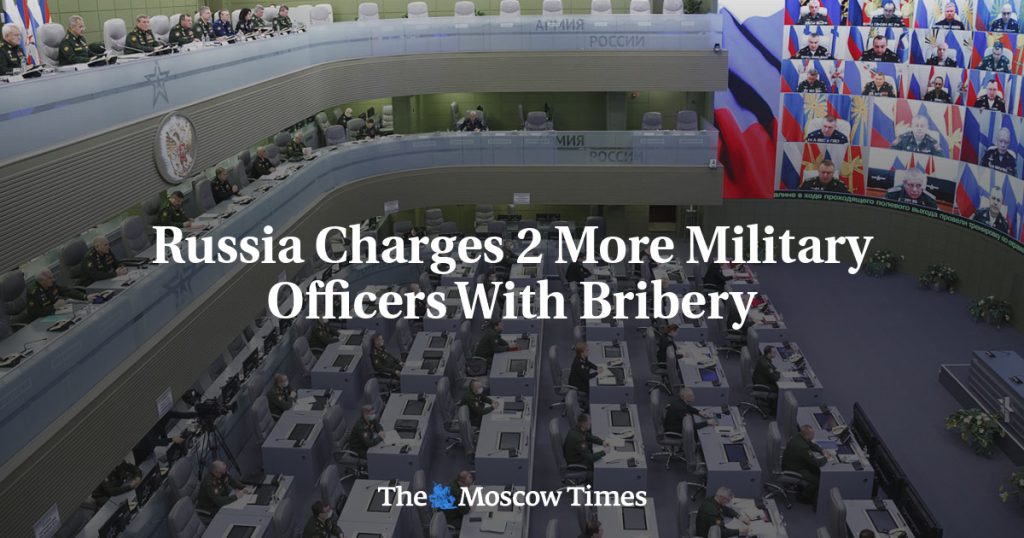In recent times, the Russian Defense Ministry has been facing a series of corruption scandals resulting in the arrest of several senior military officials. This includes the dismissal of Sergei Shoigu as Russia’s defense minister in May, indicating a deep-rooted issue within the military. The latest wave of arrests involves two military officers, Ivan Populovsky and Grigory Zorin, who have been charged with receiving bribes totaling over 11 million rubles from companies supplying electrical goods and cables to the Defense Ministry. The men were allegedly expected to weaken their oversight of the goods and provide the companies with “other privileges and preferences” during state contracts, as reported by Russia’s Investigative Committee, which handles major crimes. The defendants have pleaded guilty, and investigations into their involvement in other similar crimes, such as embezzlement of funds allocated for state defense orders, are ongoing.
The string of corruption cases within the Russian military has intensified since the full-scale invasion of Ukraine, drawing attention to the prevalent issue of corruption within the Defense Ministry. With repeated scandals tarnishing the reputation of the military since the collapse of the Soviet Union, the recent arrests indicate a renewed focus on tackling corruption within the ranks. Last week, four current and former Russian officials, including one linked to the Defense Ministry, were detained in separate corruption cases, signaling a wider crackdown on corrupt practices within the government. The purge within the military seems to be aimed at restoring integrity and accountability within the Defense Ministry, especially in light of recent developments and geopolitical tensions.
The alleged corruption within the Russian Defense Ministry has raised concerns about the misuse of funds allocated for state defense orders and the potential compromise of national security. The charges brought against military officers involved in bribery schemes with suppliers point to systemic issues within the procurement process and oversight mechanisms. The promise of “other privileges and preferences” granted to companies in exchange for bribes suggests a lack of transparency and accountability in awarding state contracts, highlighting the need for robust anti-corruption measures within the Defense Ministry. The investigations carried out by the Investigative Committee underscore the government’s commitment to rooting out corruption and ensuring the proper allocation of resources for national defense.
The crackdown on corruption within the Russian military reflects broader efforts to promote transparency and accountability in government institutions. The recent arrests of high-ranking officials, including the dismissal of the defense minister, signify a willingness to address deep-seated issues affecting the Defense Ministry. The involvement of multiple officials in bribery and embezzlement schemes underscores the pervasive nature of corruption within the military, necessitating a comprehensive overhaul of governance practices and procurement policies. By targeting individuals engaged in corrupt activities and conducting thorough investigations, law enforcement authorities aim to send a strong message that corruption will not be tolerated within the Russian military.
The challenges faced by independent journalists in reporting on government corruption underscore the importance of a free press in holding authorities accountable and exposing misconduct. The labeling of media organizations as “undesirable” or “foreign agents” in an attempt to stifle critical reporting further emphasizes the need for an independent and impartial press. The Moscow Times, faced with threats and intimidation from government authorities, continues to champion open journalism and provide accurate reporting on issues of public interest, including corruption within the Russian Defense Ministry. The support of readers and advocates for press freedom is crucial in ensuring the continued operation of media outlets that uphold journalistic integrity and serve as watchdogs of government accountability.
In conclusion, the recent wave of arrests and charges related to corruption within the Russian Defense Ministry highlights the urgent need for comprehensive reforms to enhance transparency, accountability, and integrity within the military. The ongoing investigations into bribery, embezzlement, and other corrupt practices indicate a concerted effort by law enforcement authorities to combat systemic corruption and ensure the proper use of state resources for national defense. The purge within the military, symbolized by the dismissal of senior officials and the arrest of military officers, reflects a broader commitment to rooting out corruption at all levels of government. The role of independent journalism in exposing corruption and speaking truth to power remains crucial in upholding democratic values and promoting good governance practices in Russia.














